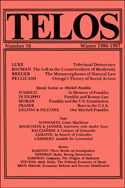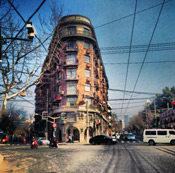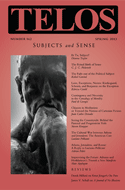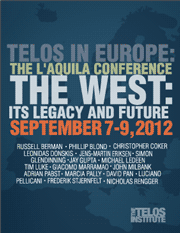By Telos Press · Monday, May 4, 2015
Beyond Nostalgia:
Ethics, Politics, and the Critique of Modernity
January 15–16, 2016
New York, NY
On January 15–16, 2016, the Telos-Paul Piccone Institute will hold its annual conference in New York City. The theme of the conference will be “Beyond Nostalgia: Ethics, Politics, and the Critique of Modernity.” If you wish to participate in the conference, please send an abstract (no more than 250 words) and short c.v. to telosnyc@telosinstitute.net by August 15, 2015, and place “The 2016 Telos Conference” in the email’s subject line.
Continue reading →
By Monika Lemke · Tuesday, April 7, 2015  Premised on the Left’s fundamental inability to dissociate itself from the ideals of the bourgeois revolution, Zygmunt Bauman’s “The Left as the Counter-Culture of Modernity” introduces the notion of reconstituting “the Left as the counter-culture of modernism,” rather than as the “counter-culture of capitalism.” Bauman makes the case for this repositioning because, in his view, there is no historical agent to carry out an anti-capitalist program. However, by continuing to defend and maintain the Left’s core values of individual autonomy and political democracy, Bauman believes that the Left can identify the barriers preventing their realization in the present neoliberal paradigm. Bauman recounts the Left’s courtship with various strategies, namely, the heterodox critique of capitalist practice and professed affinity with the industrial working class, and the recent flirtation with postmodern theory. By examining each as it addresses the present historical paradigm, he emphasizes the need to rehabilitate the values of the Leftist program and search for alternative strategies to realize them. Premised on the Left’s fundamental inability to dissociate itself from the ideals of the bourgeois revolution, Zygmunt Bauman’s “The Left as the Counter-Culture of Modernity” introduces the notion of reconstituting “the Left as the counter-culture of modernism,” rather than as the “counter-culture of capitalism.” Bauman makes the case for this repositioning because, in his view, there is no historical agent to carry out an anti-capitalist program. However, by continuing to defend and maintain the Left’s core values of individual autonomy and political democracy, Bauman believes that the Left can identify the barriers preventing their realization in the present neoliberal paradigm. Bauman recounts the Left’s courtship with various strategies, namely, the heterodox critique of capitalist practice and professed affinity with the industrial working class, and the recent flirtation with postmodern theory. By examining each as it addresses the present historical paradigm, he emphasizes the need to rehabilitate the values of the Leftist program and search for alternative strategies to realize them.
Continue reading →
By Jacob Dreyer · Monday, April 21, 2014 In this series of entries, Jacob Dreyer investigates the spatial forms of modernity in China, notably that of the Metropolis (e.g., Shanghai) and the Wasteland (e.g., Heilongjiang). In his last piece, he read the two regions through Schmitt’s dialectic of land and sea; here, he reads Shanghai through Dostoyevsky’s vision of the Crystal Palace; the next piece will subject the exterior, the “Great Northern Wasteland,” to a similar analysis.
 If the goal of the project of modernity in China is ultimately the integration of the entire territory of PRC China into an urbanized “interior,” with no useless or wild zones, of universalizing the social practices of the metropolis, then an investigation into the unique spatial forms that did not emerge until modernity—and their shadow in consciousness, visible in the work of philosophers, writers, and architects—is necessary. As discussed in my previous post, Chinese literati have been exploring the territory since the beginning of civilization in Asia. In fact, it would not be inaccurate to say that the beginning of civilization is created by the initial architectural division between “inside” and “outside,”[1] created by architecture—physical edifices, no doubt, but also the structures of thought and language which tend to divide the world into two zones, interior and exterior. If the goal of the project of modernity in China is ultimately the integration of the entire territory of PRC China into an urbanized “interior,” with no useless or wild zones, of universalizing the social practices of the metropolis, then an investigation into the unique spatial forms that did not emerge until modernity—and their shadow in consciousness, visible in the work of philosophers, writers, and architects—is necessary. As discussed in my previous post, Chinese literati have been exploring the territory since the beginning of civilization in Asia. In fact, it would not be inaccurate to say that the beginning of civilization is created by the initial architectural division between “inside” and “outside,”[1] created by architecture—physical edifices, no doubt, but also the structures of thought and language which tend to divide the world into two zones, interior and exterior.
Continue reading →
By Telos Press · Sunday, December 1, 2013 Chantal Bax’s Subjectivity After Wittgenstein: The Post-Cartesian Subject and the “Death of Man” is now available in paperback from Bloomsbury Academic. Although Wittgenstein is often held co-responsible for the so-called death of man as it was pronounced in the course of the previous century, no detailed description of his alternative to the traditional or Cartesian account of human being has so far been available. By consulting several parts of Wittgenstein’s later oeuvre, Subjectivity after Wittgenstein aims to fill this gap.
Continue reading →
By Russell A. Berman · Monday, March 18, 2013 Telos 162 (Spring 2013) is now available for purchase in our store.
 At its inception, Telos pursued a specific project as a journal: to serve as a bridge between the world of what was then often referred to as “European theory” and a U.S. intellectual world largely defined by quantitative methods in the social sciences. Over time, the terminology changed, and it is now more common to use the parlance of “analytic” and “continental” modes of philosophy, and if the latter term still clearly points toward Europe, there are representatives of both trends in the university lives on both sides of the Atlantic. In retrospect, however, the question for Telos was never one of a simple cultural transfer or the pursuit of some intellectual equilibrium in which scholars in both worlds would think the same way. On the contrary, instead of thinking about method in general, at stake for Telos was the difference between reflections on the meaning of the human condition, thoughtful explorations of the good life, and what appeared to be an exclusively numerical measuring of the status quo, a positivist description of what already exists, with no expectation of change. At its inception, Telos pursued a specific project as a journal: to serve as a bridge between the world of what was then often referred to as “European theory” and a U.S. intellectual world largely defined by quantitative methods in the social sciences. Over time, the terminology changed, and it is now more common to use the parlance of “analytic” and “continental” modes of philosophy, and if the latter term still clearly points toward Europe, there are representatives of both trends in the university lives on both sides of the Atlantic. In retrospect, however, the question for Telos was never one of a simple cultural transfer or the pursuit of some intellectual equilibrium in which scholars in both worlds would think the same way. On the contrary, instead of thinking about method in general, at stake for Telos was the difference between reflections on the meaning of the human condition, thoughtful explorations of the good life, and what appeared to be an exclusively numerical measuring of the status quo, a positivist description of what already exists, with no expectation of change.
Continue reading →
By Marcia Pally · Wednesday, December 5, 2012 This paper was presented at Telos in Europe: The L’Aquila Conference, held on September 7-9, 2012, in L’Aquila, Italy.
 Whatever the ostensible theme of the September 2012 Telos conference, it seems the real one was the mess in the West. Has the West lost its pizzazz, gravitas, ability to guide? Have we become too secular, merely rational, and thus paradoxically ungrounded? Or are we not rational enough, our politics and economics still beset by emotional, quasi-religious beliefs? Whatever the ostensible theme of the September 2012 Telos conference, it seems the real one was the mess in the West. Has the West lost its pizzazz, gravitas, ability to guide? Have we become too secular, merely rational, and thus paradoxically ungrounded? Or are we not rational enough, our politics and economics still beset by emotional, quasi-religious beliefs?
From my perch, the West hasn’t lost anything but rather has gotten too much of what might be a good thing were there less of it. That thing is separability, and too much of it, untempered by situatedness, yields abandonment and anomie on one hand and selfishness on the other. Of course, too much situatedness would be equally damaging—oppressive and stultifying. It is the binary choice—separabilty or situatedness—that leads the West to the worst of itself. Thus what is needed are frameworks that foster the simultaneous presence of both. Here I’ll point to one, theologies of relationality.
Continue reading →
|
|
 Premised on the Left’s fundamental inability to dissociate itself from the ideals of the bourgeois revolution, Zygmunt Bauman’s “The Left as the Counter-Culture of Modernity” introduces the notion of reconstituting “the Left as the counter-culture of modernism,” rather than as the “counter-culture of capitalism.” Bauman makes the case for this repositioning because, in his view, there is no historical agent to carry out an anti-capitalist program. However, by continuing to defend and maintain the Left’s core values of individual autonomy and political democracy, Bauman believes that the Left can identify the barriers preventing their realization in the present neoliberal paradigm. Bauman recounts the Left’s courtship with various strategies, namely, the heterodox critique of capitalist practice and professed affinity with the industrial working class, and the recent flirtation with postmodern theory. By examining each as it addresses the present historical paradigm, he emphasizes the need to rehabilitate the values of the Leftist program and search for alternative strategies to realize them.
Premised on the Left’s fundamental inability to dissociate itself from the ideals of the bourgeois revolution, Zygmunt Bauman’s “The Left as the Counter-Culture of Modernity” introduces the notion of reconstituting “the Left as the counter-culture of modernism,” rather than as the “counter-culture of capitalism.” Bauman makes the case for this repositioning because, in his view, there is no historical agent to carry out an anti-capitalist program. However, by continuing to defend and maintain the Left’s core values of individual autonomy and political democracy, Bauman believes that the Left can identify the barriers preventing their realization in the present neoliberal paradigm. Bauman recounts the Left’s courtship with various strategies, namely, the heterodox critique of capitalist practice and professed affinity with the industrial working class, and the recent flirtation with postmodern theory. By examining each as it addresses the present historical paradigm, he emphasizes the need to rehabilitate the values of the Leftist program and search for alternative strategies to realize them.  If the goal of the project of modernity in China is ultimately the integration of the entire territory of PRC China into an urbanized “interior,” with no useless or wild zones, of universalizing the social practices of the metropolis, then an investigation into the unique spatial forms that did not emerge until modernity—and their shadow in consciousness, visible in the work of philosophers, writers, and architects—is necessary. As discussed in my previous post, Chinese literati have been exploring the territory since the beginning of civilization in Asia. In fact, it would not be inaccurate to say that the beginning of civilization is created by the initial architectural division between “inside” and “outside,”[1] created by architecture—physical edifices, no doubt, but also the structures of thought and language which tend to divide the world into two zones, interior and exterior.
If the goal of the project of modernity in China is ultimately the integration of the entire territory of PRC China into an urbanized “interior,” with no useless or wild zones, of universalizing the social practices of the metropolis, then an investigation into the unique spatial forms that did not emerge until modernity—and their shadow in consciousness, visible in the work of philosophers, writers, and architects—is necessary. As discussed in my previous post, Chinese literati have been exploring the territory since the beginning of civilization in Asia. In fact, it would not be inaccurate to say that the beginning of civilization is created by the initial architectural division between “inside” and “outside,”[1] created by architecture—physical edifices, no doubt, but also the structures of thought and language which tend to divide the world into two zones, interior and exterior.  At its inception, Telos pursued a specific project as a journal: to serve as a bridge between the world of what was then often referred to as “European theory” and a U.S. intellectual world largely defined by quantitative methods in the social sciences. Over time, the terminology changed, and it is now more common to use the parlance of “analytic” and “continental” modes of philosophy, and if the latter term still clearly points toward Europe, there are representatives of both trends in the university lives on both sides of the Atlantic. In retrospect, however, the question for Telos was never one of a simple cultural transfer or the pursuit of some intellectual equilibrium in which scholars in both worlds would think the same way. On the contrary, instead of thinking about method in general, at stake for Telos was the difference between reflections on the meaning of the human condition, thoughtful explorations of the good life, and what appeared to be an exclusively numerical measuring of the status quo, a positivist description of what already exists, with no expectation of change.
At its inception, Telos pursued a specific project as a journal: to serve as a bridge between the world of what was then often referred to as “European theory” and a U.S. intellectual world largely defined by quantitative methods in the social sciences. Over time, the terminology changed, and it is now more common to use the parlance of “analytic” and “continental” modes of philosophy, and if the latter term still clearly points toward Europe, there are representatives of both trends in the university lives on both sides of the Atlantic. In retrospect, however, the question for Telos was never one of a simple cultural transfer or the pursuit of some intellectual equilibrium in which scholars in both worlds would think the same way. On the contrary, instead of thinking about method in general, at stake for Telos was the difference between reflections on the meaning of the human condition, thoughtful explorations of the good life, and what appeared to be an exclusively numerical measuring of the status quo, a positivist description of what already exists, with no expectation of change.  Whatever the ostensible theme of the September 2012 Telos conference, it seems the real one was the mess in the West. Has the West lost its pizzazz, gravitas, ability to guide? Have we become too secular, merely rational, and thus paradoxically ungrounded? Or are we not rational enough, our politics and economics still beset by emotional, quasi-religious beliefs?
Whatever the ostensible theme of the September 2012 Telos conference, it seems the real one was the mess in the West. Has the West lost its pizzazz, gravitas, ability to guide? Have we become too secular, merely rational, and thus paradoxically ungrounded? Or are we not rational enough, our politics and economics still beset by emotional, quasi-religious beliefs? 






